For anyone who’s ever loved science and thought about making it into a career, an online biology degree could be a good fit.

While studying life and living organisms, you’ll learn about microbes, plants, animals, and people. This degree could help you move toward a career in healthcare, agriculture, environmental protection, education, or another field.
Editorial Listing ShortCode:
After graduating with a bachelor’s in biology, you might choose to go straight into the workforce or pursue further scientific study at the graduate level.
Online Biology Degrees

Biology is the science of life. Biologists study everything from the tiniest microbes to the tallest redwoods. Whether you’re interested in plants, animals, humans, or microorganisms, you may be fascinated by the things you’ll learn while earning an online bachelor’s in biology.
The topics in your program might include:
- Botany
- Ecology
- Evolution
- Genetics
- Human anatomy
- Microbes
- Science writing
- Statistics
- Taxonomy
- Zoology
In addition to completing biology-focused coursework, you’ll also take some chemistry and physics classes. There may be math requirements too.
Science courses often involve lab work, and being an online student doesn’t mean that you won’t do labs. Rather than carrying out experiments in an on-campus laboratory, you might do them at home with materials from a kit. There could be online labs as well. This would also be true of online masters in biology, online PhD in Biology, and even online biomedical science degree programs at a number of universities.
Editorial Listing ShortCode:
This program is commonly offered as an online Bachelor of Science degree in biology. Some colleges, though, have a Bachelor of Arts program for biology. BS degrees typically include a greater number of science courses. BA students may explore non-science disciplines as well. A BS usually offers more strategic preparation for those who want to become researchers.
Biology is a diverse field, so you may be able to narrow your studies with a specialization. Specialization examples include:
- Wildlife biology
- Cell biology
- Ecology
- Forensics
- Genetics
- Science education
Some schools include these as concentration tracks, while others offer separate degree programs for various specialties. Some students choose a bachelors degree in biology as the foundation for professional studies. For example, they might plan to go to medical or veterinary school after graduation. In preparation, colleges may offer a pre-professional track for the biology degree.
If that path’s not right for you, what can you do with a biology degree? A number of graduates go on to become lab technicians or to work as scientists. Various subfields of biology to consider include food science, forensic science, zoology, and microbiology. Some biology graduates also go into teaching. A career in education could allow you to shape young minds and help students develop a love for science.
Biology Careers & Salaries
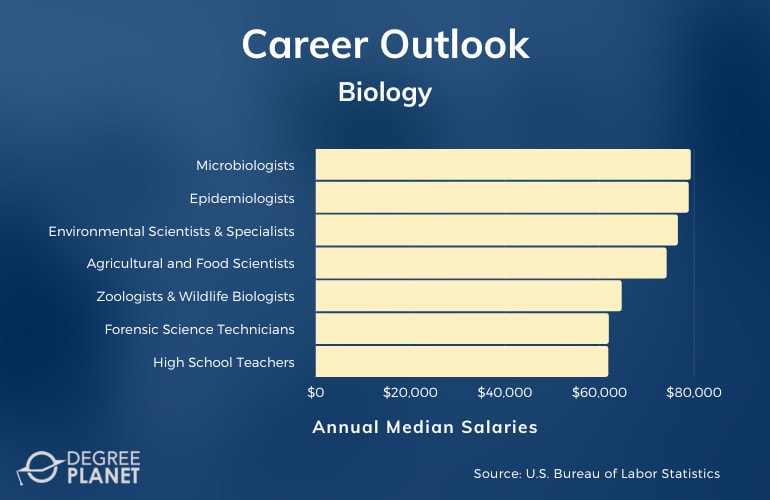
Biology majors may take a variety of scientific roles. Technician jobs are often entry-level positions. As a technician, you might assist scientists with their field research, lab experiments, or other tasks.
Often, there isn’t a formal educational requirement for being a technician in agricultural science, food science, or environmental protection. You might even be able to gain experience in one of those positions while working toward your online degree in biology.
After graduation, working as a biological technician might be a natural next step. That role usually requires a bachelor’s degree. Biology studies are relevant to many branches of science. Biology majors could end up pursuing jobs as microbiologists, zoologists, or wildlife biologists.
If you’re passionate about knocking out pollution, you might consider pursuing a career as an environmental specialist. As a forensic scientist, you might help solve crimes. According to the Bureau of Labor Statistics, here are some career paths related to the study of biology, along with their median salaries.
| Careers | Annual Median Salaries |
| Microbiologists | $79,260 |
| Epidemiologists | $78,830 |
| Environmental Scientists and Specialists | $76,530 |
| Agricultural and Food Scientists | $74,160 |
| Zoologists and Wildlife Biologists | $64,650 |
| Forensic Science Technicians | $61,930 |
| High School Teachers | $61,820 |
| Clinical Laboratory Technologists and Technicians | $57,800 |
| Biological Technicians | $48,140 |
| Environmental Science and Protection Technicians | $47,370 |
A bachelors in biology could also help qualify you for a job as a food scientist or an agricultural scientist. Within agricultural science, you could specialize in soil, animal, or plant science.
Other scientist jobs typically require at least a master’s degree, but hiring qualifications vary among employers. Being an epidemiologist is one prime example. Other roles that require advanced education include biochemist, medical scientist, and biophysicist. For such jobs, you might consider getting a masters degree or a doctorate after earning your Bachelor of Science in Biology.
Editorial Listing ShortCode:
Instead of becoming in-the-field scientists, biology majors can also look into teaching. Middle and high schools need biological science teachers. Most teaching positions require a state teaching certificate in addition to a degree. If you pursue higher education, you could think about teaching college biology instead.
Bachelor of Biology Curriculum & Courses

If you decide to get a biology degree, you’ll naturally take a lot of science courses. Colleges for biology often have classes like the ones listed below:
- Biology I and II: Before diving into more specialized classes, you’ll probably take at least two semesters that provide a general overview of biological concepts.
- Botany and Plants: You’ll learn the characteristics and classifications of the plant kingdom and explore the methods that scientists use for studying plants.
- Cell Biology: In this class, you’ll examine biological processes on a tiny level, studying how cells are structured and what functions they carry out.
- Ecology: As you learn about organisms’ interactions with their surroundings, you may also discuss environmental problems and potential solutions.
- Genetics: During your program, you’ll probably study what genes are, what characteristics they control, and how scientists conduct genetic research.
- Human Anatomy: This course covers the structure of the human body and how the various parts work together.
- Microbiology: Topics in a microbiology class might include bacteria, fungi, viruses, and protozoa.
- Science Communication: There may be a class that focuses on how to properly compose lab reports, write science articles, and deliver oral presentations on scientific topics.
- Statistics: Studying statistics can help prepare you to draw conclusions from the data you gather during experiments.
- Zoology: You may study the bodies, habitats, feeding patterns, and reproductive methods of vertebrate and invertebrate animals.
Many of the classes in a biology program include laboratory components.
How to Choose an Online Bachelor’s Degree in Biology Program
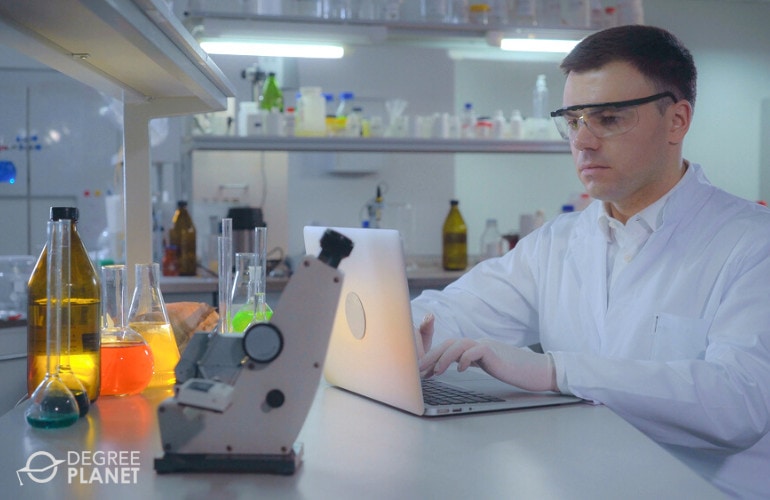
Comparing biology degrees online may feel overwhelming at first since there are many schools that offer science programs.
Thinking through what you want in your college experience and comparing how various schools stack up might help you decide where to enroll. Here are some common factors to consider:
- Accreditation. It’s strategic to remember that regional accreditation is a mark of a credible school.
- Concentrations. If you have a certain career goal in mind or want to study a specific branch of biology, you can choose a university with a relevant concentration option. Popular tracks include secondary education, pre-health professions, cell biology, and forensic science.
- Faculty research. Professors are often engaged in research projects, and some allow undergraduate students to participate in their work. In addition to checking whether a school offers research opportunities for undergrads, you might also want to consider faculty members’ primary research areas.
- Lab style. Since lab work is required for this type of program, you might ask whether the school will have you complete experiments at home or participate in on-campus intensive sessions. Programs may also offer virtual lab options that incorporate cutting-edge technology.
- Student groups. Some schools’ biology clubs include campus chapters of the American Society for Microbiology or the American Association of Pharmaceutical Scientists. Membership might be open to both on-campus and online students.
Cost could be another one of your deciding factors, but a robust financial aid package might help bring down the price of a more expensive school.
Admissions Requirements

Some colleges have liberal admissions policies, while others are quite selective. No matter which type you choose, possible application materials include:
- ACT or SAT scores (only some schools require them)
- Letters of recommendation
- Personal essay
- Transcripts from high school and any college courses
If you apply for a teacher education track, you may also be required to pass a basic skills exam and submit a background check.
Bachelors in Biology Online Programs Accreditation
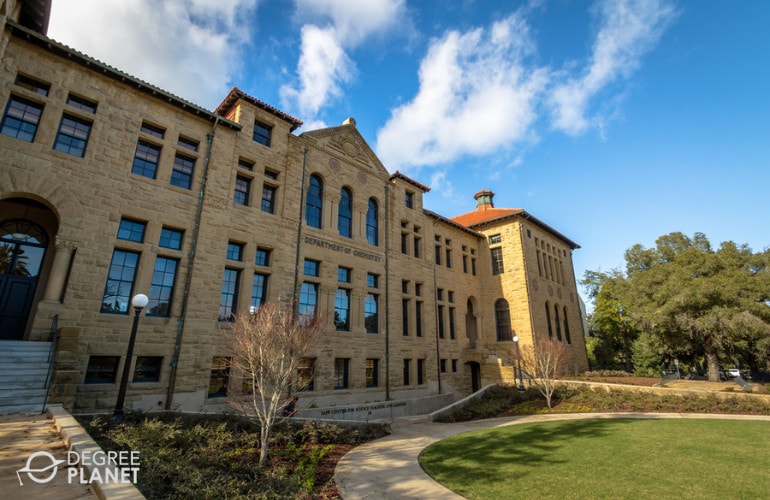
Since you’re going to college for a good education, it’s strategic to do everything you can to make sure you’re choosing a reputable school. Fortunately, that doesn’t have to be difficult. You can simply look into whether a prospective school has been regionally accredited.
Editorial Listing ShortCode:
Regional accreditation is a sign that a school lives up to educational standards. It can increase the likelihood of your credits being transferrable, and it can also boost your chances of getting into grad school. Employers often prefer candidates who have an accredited school on their resume, too. An accredited degree is a common qualification for licensing boards as well.
Financial Aid and Scholarships

When it comes to earning a college degree, government, institutional, and private aid can help break down financial barriers.
Government assistance can come from both state and federal agencies. Your eligibility will depend primarily on your income and resources. Filling out the Free Application for Federal Student Aid (FAFSA), can determine your eligibility for receiving loans or grants.
Institutional aid is granted by your college. It’s often given as scholarships for the first year of your studies or for the entirety of your studies. Scholarships are a common form of private aid, too. The process of receiving a scholarship usually involves applying for the program and then being selected from a pool of candidates.
Workplace assistance is another type of private aid. Some employers pay for part of their workers’ college costs. Some students also use private loans, but these usually carry higher interest rates than government loans.
Can You Get a Biology Degree Online?

Yes, online study is possible for biology degrees. Through an accredited school, you can earn a reliable, reputable online degree that’s respected by potential employers. Online college students often log in to watch video lectures or participate in discussion boards. They often complete assignments at home and upload them for grading.
Being an online student doesn’t mean that you’ll miss out on biology labs. You may be able to run some experiments at home, and others can be done in virtual laboratories through your college’s online platform. Some colleges have their online science students come to campus occasionally.
Is Biology a Useless Degree?
Biology is actually a quite useful degree, depending on your career interests. With a BA in Biology, you could consider becoming a science journalist or a high school teacher. It would also give you a scientific foundation before entering law school or an MBA program. That mix of studies could help prepare you for a unique career niche.
A BS in Biology could help prepare you for lab technician or scientist roles. You might work in a field like microbiology or food science. After getting a BS, you could also explore graduate studies in epidemiology, biochemistry, or medical science. You might even enter veterinary or dental school. According to the Bureau of Labor Statistics, most life science occupations are expected to have positive job growth over the next ten years.
What Can You Do with a Bachelor’s in Biology?

Many biology majors start out as biological technicians. Technicians help scientists by collecting samples, running experiments, and recording data. The experience you earn in that type of job might help you move into more advanced roles, such as environmental scientist, food scientist, or wildlife biologist.
If it’s an option for you to get a teaching certificate with your degree, you could qualify to teach science classes at the junior-high or high-school level. Some graduates even pursue work as science writers for magazines or websites.
Is Biology a Hard Major?

Whether a major is hard is subjective, and it often depends on your interests and proficiencies. As a biology major, you’ll take many science classes, such as microbiology and botany. Some will require lab work. There may be a lot of facts and formulas to memorize as well.
Editorial Listing ShortCode:
The science classes won’t be limited only to biology topics. You’ll probably need to take some chemistry and physics courses too. Most biology majors have to take some advanced math classes as well. You’ll engage in lab work during many of your classes. In addition to running experiments and recording data, you can learn how to share your results through lab reports, papers, or oral presentations.
What Jobs Can You Get with a Biology Major?

Some people who graduate with degrees in biology work in laboratories or other research settings. They may work as technicians who help with experiments or data collection. Others are scientists who lead research projects. Some study soil, while others focus on plants, animals, germs, or the environment.
Graduate education is common in the biology field, but it’s not essential. According to the Bureau of Labor Statistics, many biological science jobs are available to people with bachelor’s degrees. A bachelor’s is also a common prerequisite for secondary school teaching positions or science writing positions.
Where Can I Work with a Biology Degree?
Data from the Bureau of Labor Statistics shows that several different sectors hire biological technicians. The most common employers are research organizations, universities, government agencies, hospitals, and pharmaceutical companies.
Many scientists—such as zoologists, microbiologists, and environmental specialists—also work for universities or government agencies. Engineering and consulting firms could be other potential workplaces. Some biology graduates become teachers. Depending on their education level, they may teach in elementary, secondary, or postsecondary schools.
How Long Does It Take to Get an Online Biology Degree?
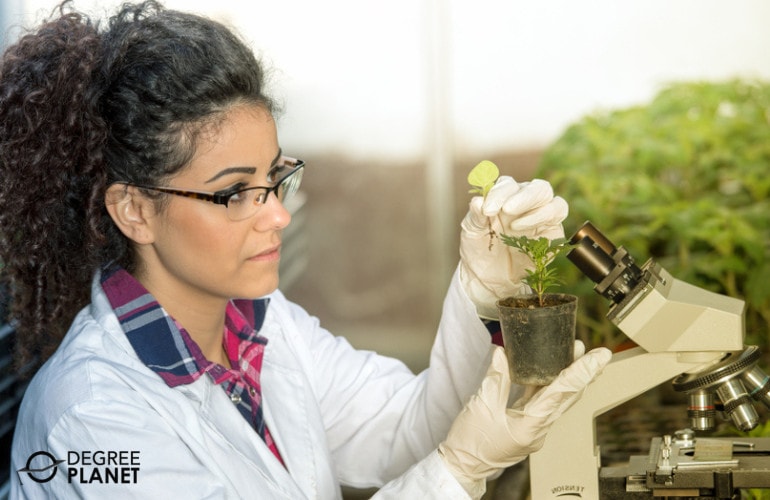
It generally takes 4 years of college to earn a bachelor’s degree with full-time study, but that’s not always the case. Online students are sometimes able to finish more speedily.
By using shorter terms and a year-round calendar, online colleges often allow students to move through school at a faster-than-average pace. On the other hand, not all bachelors students graduate within 4 years. If you enroll part-time instead of full-time, it may take you longer to finish your degree program.
What’s the Difference Between a Biology BA vs. BS Degree?
Most schools with biology programs offer the degree as a Bachelor of Science (BS), but some have a Bachelor of Arts (BA) biology degree.
| BS in Biology | BA in Biology |
|
|
College advisors can help you decide which degree to pursue.
Is a Biology Degree Worth It?

Yes, a biology degree is worth it for many students. The Bureau of Labor Statistics projects that science jobs are growing at an 8% rate over the next ten years.
Biology-related careers with even higher growth rates include soil and plant scientists (10% job growth), animal scientists (10%), forensic science technicians (16%), and epidemiologists (30%). Biology includes many subfields. During college, you can take classes on plants, animals, bacteria, and conservation.
Editorial Listing ShortCode:
After exploring so many different topics during college, you could take your career in any number of directions after graduation. Available options might include work in laboratories, classrooms, or the great outdoors.
Universities Offering Online Bachelors in Biology Degree Program
Methodology: The following school list is in alphabetical order. To be included, a college or university must be regionally accredited and offer degree programs online or in a hybrid format.

Arizona State University offers an online program for a Bachelor of Science in Biological Sciences. The program requires a total of 39 classes, which are each 7.5 weeks long. Students can choose a concentration in Biology and Society, Biomedical Sciences, Conservation Biology and Ecology, or Genetics, Cell, and Developmental Biology.
Arizona State University is accredited by the Higher Learning Commission of the North Central Association of Colleges and Schools.
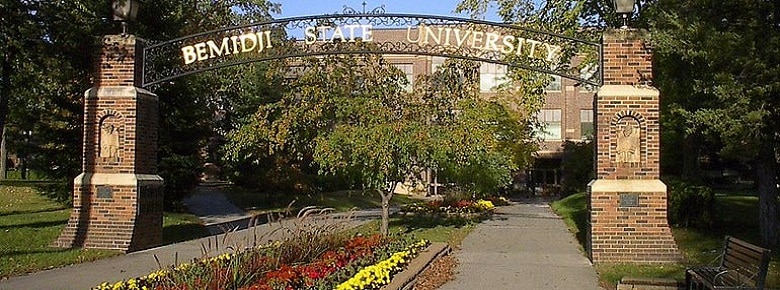
Bemidji State University offers a BS and a BA in Biology. Both programs use a blended format, with about half the classes online and the other half in-person. Students in the program are given research and internship opportunities. There is also an emphasis option in Medical Sciences.
Bemidji State University is accredited by the Higher Learning Commission.

Florida International University offers a Bachelor of Arts in Biological Sciences. The program is fully online and can be started in the fall, spring, or summer. Courses include Biology Career Planning, Cellular Chemistry, Genetics, Ecology, and more. The curriculum emphasizes critical thinking and real-world problem-solving skills.
Florida International University is accredited by the Commission on Colleges of the Southern Association of Colleges and Schools.

Kean University offers both Bachelor of Arts and Bachelor of Science options in Biology. There is a teacher certification track, a forensic option, and a health professions track with concentrations for pre-med, pre-DPT, pre-PA, and pre-OT students. Research, study abroad, and networking opportunities are integrated into the curriculum.
Kean University is accredited by the Middle States Commission on Higher Education.
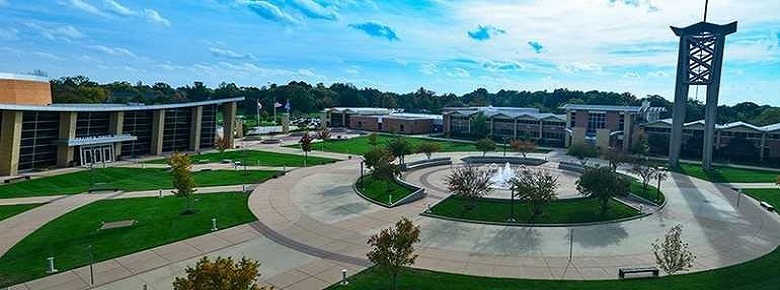
Logan University offers an online program for a Bachelor of Science in Human Biology. The degree can help prepare students for careers in research, education, or healthcare. Logan uses a trimester academic calendar, with each term lasting 15 weeks. Accelerated 7 week classes are available for basic science coursework.
Logan University is accredited by the Higher Learning Commission.

Texas Tech University offers a Bachelor of Science in Biology. The degree is appropriate for students who wish to pursue careers in medicine, veterinary medicine, pharmaceuticals, physical therapy, and related fields. Coursework includes Organic Evolution, Principles of Ecology, Cell Biology, Genetics, Experimental Principles of Chemistry, and more.
Texas Tech University is accredited by the Southern Association of Colleges and Schools Commission on Colleges.

The University of Alaska—Fairbanks offers an online BS in Biology program. Students in the program are required to complete a capstone research project to graduate. Courses in the program include Principles of Genetics, Cell and Molecular Biology, General Biochemistry: Metabolism, Structure, and Function of Vascular Plants, and more.
University of Alaska Fairbanks is accredited by the Northwest Commission on Colleges and Universities.

The University of Arizona offers a Bachelor of Science in Biology. Two concentration options are available: Organismal Biology and Biomedical Sciences. Coursework includes Ecology, Genetics, Foundations in Biochemistry, Evolutionary Biology, and more. Most coursework is available 100% online, but two organic chemistry labs are delivered in a hybrid format.
The University of Arizona is accredited by the Higher Learning Commission.

The University of Florida offers a Bachelor of Arts in Biology. The online format provides flexible scheduling but is still academically rigorous. The multidisciplinary curriculum includes courses such as Integrated Principles of Biology I and II, Essential Cell Biology, Population Genetics, and more.
The University of Florida is accredited by the Southern Association of Colleges and Schools Commission on Colleges.
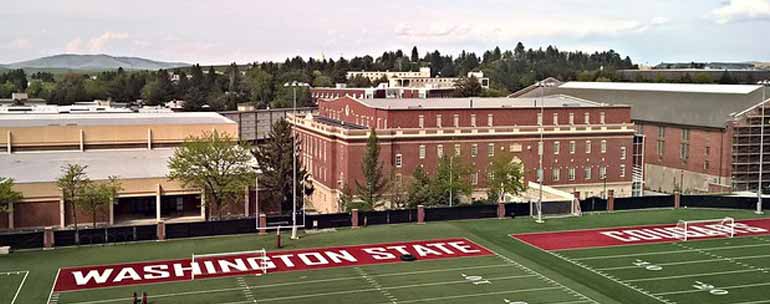
Washington State University’s Global Campus offers a Bachelor of Science in Biology. This is a degree completion program for students who have already taken certain courses on campus or at another university. Courses that can be taken through WSU Global include General Ecology, General Genetics, Principles of Organic Evolution, Introductory Biochemistry, and more.
WSU is accredited by the Northwest Commission on Colleges and Universities.
Getting Your Bachelor Degree in Biology Online

Biology is an exciting science with many niche areas to explore. Whether you’re most interested in cells, animals, microbes, or ecology, you can pursue your passion by earning a biology degree.
Professionals in this field tend to contribute to scientific thought and discovery as lab technicians, scientists, or educators. No matter where this degree program may someday take you, you might think about starting your journey with an online college education.
Many accredited schools offer the opportunity to earn a thorough, credible education online in a flexible manner. If you’re ready for a robust science education, you can start exploring accredited online biology programs today.

